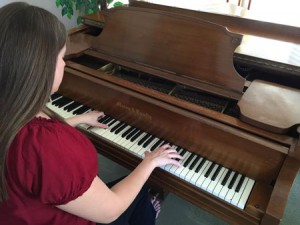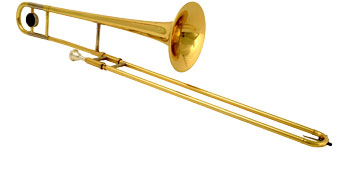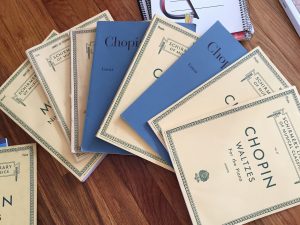
What musical instrument should you learn to play? Good question! Whether you’ve been wishing for years that you could learn to play piano (you can!) or you’re trying to help your child choose and they have no idea what a clarinet is, it can be a tough decision. And what if you start an instrument but then you don’t like it? Or how do you make the right choice between two instruments if you’ve never played either?
To help you answer this question, I’m doing a series of blogposts. This post, Part 1, is for everyone but especially for adults or teens trying to choose their own instrument. Part 2 will be primarily for parents trying to help their child choose an instrument. Part 3 will be my opinions on the experience of learning various specific instruments.
Piano First!
 Before I say anything else, I strongly recommend learning to play piano. SO many people have come up to me over the years, saying, “I wish I’d learned to play the piano!” or, “I wish I hadn’t quit taking piano lessons when I was a kid!” This by far the most common instrument to learn and in my opinion, it’s the most versatile. You can play music of any style on the piano and have a great time doing it! On piano you learn to play melody, harmony, and accompaniment all at the same time, which teaches you a great understanding of music as a whole. Learning piano also has all kinds of other benefits, and since it teaches you to read music for high notes AND low notes, it’s easier to go from learning piano to another instrument later. Piano has the greatest potential of any instrument to lead you in any musical direction you want to go.
Before I say anything else, I strongly recommend learning to play piano. SO many people have come up to me over the years, saying, “I wish I’d learned to play the piano!” or, “I wish I hadn’t quit taking piano lessons when I was a kid!” This by far the most common instrument to learn and in my opinion, it’s the most versatile. You can play music of any style on the piano and have a great time doing it! On piano you learn to play melody, harmony, and accompaniment all at the same time, which teaches you a great understanding of music as a whole. Learning piano also has all kinds of other benefits, and since it teaches you to read music for high notes AND low notes, it’s easier to go from learning piano to another instrument later. Piano has the greatest potential of any instrument to lead you in any musical direction you want to go.
But of course, there are many other excellent instruments to learn besides the piano! If piano isn’t your cup of tea or if you’re more interested in a different kind of instrument, ask yourself these questions:
What kind of music do I like?
Are you a country girl, a rock lover, or a pop fan? Or are you more the type to listen to classical music and go to orchestra concerts? Do you prefer jazz like Miles Davis and Louis Armstrong? What do you like to listen to? This could help you figure out what you would like to play. For example, jazz lovers may favor trumpet, alto saxophone, piano, or trombone. Rock lovers may favor guitar or drums. And classical lovers may want to go for a stringed instrument like violin or cello, or french horn, or even oboe or bassoon. If you like all music, any band instrument could suit you, from flute or clarinet to saxophone, trumpet, trombone, or tuba. If you prefer choral music or musicals, maybe you should learn to sing instead of play an instrument. Because there are SO MANY instrument choices, pick one that will help you learn to play (or sing) the kind of music you like best.
* That said, recognize that many instruments cross genres. While violin mostly plays classical/orchestral, it’s also used in Celtic music, rock, jazz, and all other genres. Similarly, flute is often forgotten as a frequent jazz instrument, guitar can be rock or folk, and the piano is used for all genres.
Why do I want to learn an instrument?
If you want to learn an instrument because it sounds fun or you love music, then go for whatever you want! If you love to perform, maybe you’ll want an instrument that’s more of a solo or main instrument, like guitar, piano, violin, or trumpet. And if you want to make music your career, just remember this: making a career out of music requires a lot of dedication, typically to one main instrument. Most professional musicians have one main instrument that they’ve been mastering for YEARS. (Mine is piano, but I loved music too much to stick with just that.)
Where would I play it?
Are you going to play strictly from the comfort of your home, or are you looking for places to perform in shows or concerts? If you have the opportunity to join a local performing group, ask them what instruments they’re in need of. If you’re pretty shy and you don’t want to play in front of a major audience, then maybe you’ll want to steer clear of loud instruments like the drum set and trumpet and opt for something softer like the flute. Or, if you want to learn so that you can perform and be in the spotlight, choose an instrument that’ll highlight you onstage (guitar, drums, violin, etc). Sadly, you’re not likely to find many opportunities to play the bagpipes…
Can I find a music teacher in my area?
Having a teacher to help is essential to learning any instrument! If you live in a small city and decide you want to learn to play the oboe, you may have quite a hard time trying to find a teacher. But if you choose a more common instrument like piano, violin, or guitar, there will probably be more options. This doesn’t mean you should necessarily avoid a rarer instrument if you have your heart set on it. Just know that you’ll have to do a little digging or travel a greater distance for lessons. Fortunately, some teachers teach online music lessons. If you decide to learn piano, voice, flute, or music theory, I’d be more than happy to teach you music lessons in Corona, CA or online.
What instruments are available to me, and what can I afford?
Unfortunately, not every instrument is available everywhere at a price everyone can afford. If only! When I was in 4th grade I really wanted to learn to play the saxophone, but we didn’t have one and couldn’t afford it at the time. My sister had an old flute, though, so that’s what I ended up learning. It turns out I liked it a lot and played flute well into college, and now I teach flute lessons. But don’t let price deter you from checking out your options — you can always choose a cheaper starter instrument and upgrade it later. Also, a lot of music stores rent out instruments for affordable rates, and sometimes they even sell used instruments. If you’re not sure which instrument you like best, this is also a great way to hop from instrument to instrument until you find the one that’s perfect for you. If you know what you want to learn and you can’t seem to find it for an affordable price, ask around at music stores and schools. They’ll probably be able to help you get your hands on it.
What instrument could I physically play?
 Many people don’t even think about this question, but some individuals of smaller stature or with physical limitations may have to limit their choices. Would it be difficult to support a cello and push it around to and from orchestra practice? Do you have a bad back that would make it a miserable experience to carry around a sousaphone? Practicality should be a concern, so consider these things, but don’t let them prevent you from learning what you want to learn! Even if it may be physically difficult to play something, if it’s possible and you’re motivated, you can do it. Just recognize that a little extra work may have to go into it.
Many people don’t even think about this question, but some individuals of smaller stature or with physical limitations may have to limit their choices. Would it be difficult to support a cello and push it around to and from orchestra practice? Do you have a bad back that would make it a miserable experience to carry around a sousaphone? Practicality should be a concern, so consider these things, but don’t let them prevent you from learning what you want to learn! Even if it may be physically difficult to play something, if it’s possible and you’re motivated, you can do it. Just recognize that a little extra work may have to go into it.
Some crazy stories: I knew someone with very short arms who played the trombone, and because the trombone slide extends out further than she could reach, she’d use her foot to help. Yes, she’d push the slide out of reach with her hand and then use her foot to nudge it back into her reach. I also know a very skilled trumpet player who has no fingers on one hand. And he is an amazing musician! Even if there are obstacles, don’t let your body’s “limitations” prevent you from learning music if you want to. If you want to learn, there’s no one stopping you but yourself.
Do I want to learn more than one instrument?
If you want to learn multiple instruments, I’d definitely start with the piano for the reasons I shared earlier. Can you imagine how much easier it’ll be to learn a second instrument when all you have to do is learn how to play it, rather than learn how to play it AND how to read the music for it? You could also learn multiple instruments that are similar in one area or another. For example, the flute and saxophone have nearly the same fingerings. The clarinet and saxophone have similar mouthpieces. And many of the brass instruments are fairly easy to switch back and forth between. Once you’ve started a second instrument, it can get addicting…you could find yourself with a hunger to learn them all! (I’m still working on that myself.)
If I could play any musical instrument, what would it be?
This is the most important question you could ask yourself. What do you WANT to learn? The answer to this means more than anything else above. Learning to play a musical instrument should be something you enjoy. If you don’t even want to learn the instrument, it won’t be a very positive experience. You may even get discouraged and quit, never returning to learn what you wanted to learn in the first place. Figure out what you really want to learn, and do what you can to make it happen.



The two most important phrases in the article:
1) “Where would I play it?”
2) “If you have the opportunity to join a local performing group…”
For example, think about how many kids learn to play the trombone each year versus how little demand there is for adult trombone players in the real world. Even if you are a good trombone player, there are many others who are better. They will get the few seats available in community orchestras.